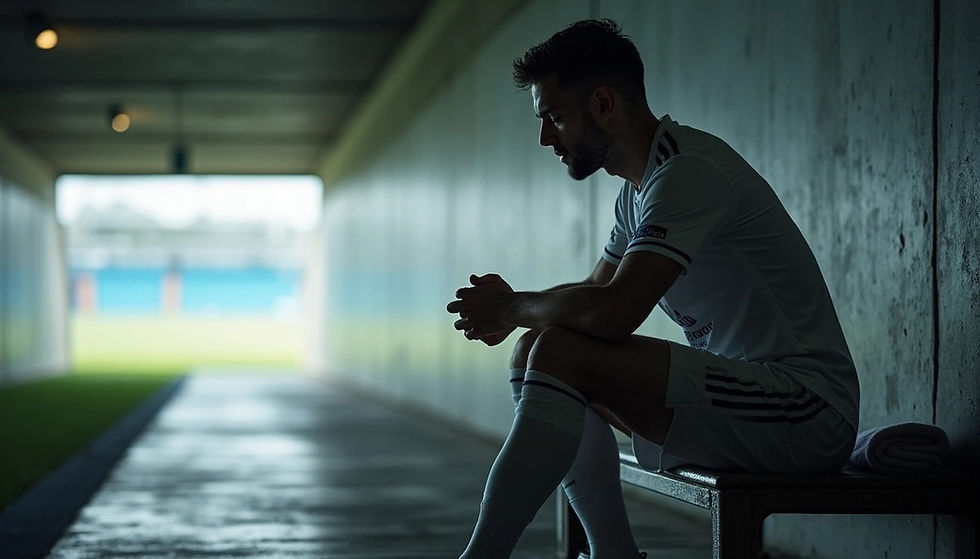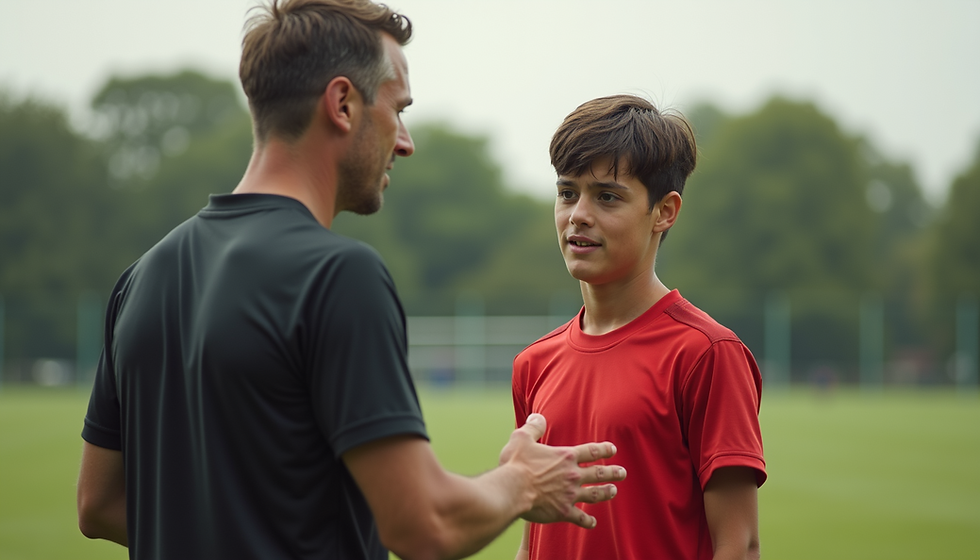How to Identify a Good Sport Psychology Supervisor: Understanding the Sport Psychology Job Description
- Dr Paul McCarthy

- Aug 25, 2025
- 7 min read

Finding the right mentor in sport psychology can make or break your professional journey. Whether you’re a graduate student entering the field or an experienced practitioner seeking advanced training, the quality of your supervision will directly impact your development, client outcomes, and career trajectory. But how do you separate exceptional supervisors from those who might hinder your growth?
The answer lies in understanding what constitutes effective supervision and knowing the specific markers that distinguish outstanding mentors in this specialized field. This guide will walk you through the essential criteria for evaluating potential supervisors, drawing from established professional standards and best practices in the UK sport psychology landscape.
Essential Elements of a Sport Psychology Job Description
A detailed sport psychology job description should outline the supervisor’s qualifications and experience in ways that immediately signal their competency level. When reviewing a sport psychology job description, look for specific credentials and training requirements that align with professional standards set by regulatory bodies.
The most qualified supervisors will hold chartered psychologist status through the British Psychological Society (BPS) and maintain active registration with the Health and Care Professions Council (HCPC). These credentials aren’t just bureaucratic requirements—they represent years of rigorous training and ongoing professional development that directly benefits your learning experience.
Additionally, effective supervisors should demonstrate full membership in the Division of Sport and Exercise Psychology for at least two years. This membership requirement ensures they’ve maintained active engagement with the field’s evolving practices and research. The best supervisors will have a sport psychology job description that emphasizes both practical and theoretical expertise, showing they can bridge the gap between academic knowledge and real-world application.
Look for supervisors who have experience across diverse athletic populations and settings. Those who’ve worked with individual athletes, teams, and various competitive levels bring valuable perspective to supervision relationships. Their varied experience translates into richer learning opportunities and more nuanced guidance as you develop your own practice.
Professional Qualifications and Regulatory Compliance
Understanding the regulatory framework surrounding sport psychology supervision helps you evaluate whether potential supervisors meet professional standards. In the UK, the pathway to becoming a qualified sport psychology practitioner involves completing the Qualification in Sport and Exercise Psychology (QSEP) Stage 2, which requires a minimum two-year supervised practice period.
Your supervisor should not only have completed this process themselves but also demonstrate ongoing compliance with professional development requirements. HCPC registration requires practitioners to maintain continuing professional development, ensuring they stay current with evolving practices and ethical standards.
When evaluating sport psychology job openings, consider the supervision opportunities available and whether they align with structured professional development pathways. Quality supervisors often emerge from competitive sport psychology job openings that prioritize mentorship and professional growth.
The regulatory landscape also emphasizes cultural safety and inclusive practice. Effective supervisors should demonstrate commitment to creating supervision environments that respect diverse backgrounds and maintain ethical standards across all interactions. This isn’t just about meeting compliance requirements—it reflects a supervisor’s ability to model the inclusive practices you’ll need in your own client work.
How Good Supervisors Approach Sports Consult Responsibilities
Effective supervisors demonstrate expertise in sports consult methodologies and approaches that extend beyond basic theoretical knowledge. A good supervisor should have experience in sports consult work with diverse athletic populations, bringing practical insights that can’t be learned from textbooks alone.
Look for supervisors who can guide you through complex sports consult scenarios with confidence and clarity. They should be able to discuss case studies, share decision-making frameworks, and help you navigate the nuanced challenges that arise in real-world practice. Their sports consult experience should encompass both individual and team dynamics, performance enhancement, and mental health considerations.
The best supervisors will also demonstrate how sports consult work integrates with broader psychological principles. They should help you understand how motivational theories, cognitive-behavioral approaches, and other psychological frameworks apply specifically to athletic contexts. This integration is crucial for developing the sophisticated understanding needed for effective practice.

Communication Quality and Relationship Dynamics
The foundation of effective supervision lies in the quality of communication and the overall relationship dynamic between supervisor and supervisee. Exceptional supervisors create environments where open dialogue flourishes, questions are welcomed, and learning happens through collaborative exploration rather than one-way instruction.
Pay attention to how potential supervisors structure their initial conversations with you. Do they ask thoughtful questions about your goals, learning style, and areas of interest? Do they clearly explain their supervision approach and expectations? These early interactions often predict the quality of the ongoing relationship.
Effective supervisors should demonstrate active listening skills and the ability to provide constructive feedback that promotes growth rather than criticism. They should be able to balance support with challenge, pushing you to expand your capabilities while providing the safety net needed for professional development.
The supervision relationship should feel collaborative rather than hierarchical. While supervisors bring expertise and experience, the best ones recognize that learning is bidirectional and that your fresh perspectives and questions contribute to their own professional growth.
Understanding CMP Handbook Requirements for Supervisors
Supervisors should be familiar with the CMP Handbook and its professional standards, as this document provides crucial guidance for ethical practice and professional development. A quality supervisor will reference the CMP Handbook when discussing ethical practices and help you understand how its principles apply to various practice scenarios.
Understanding the CMP Handbook requirements helps supervisors maintain professional excellence and ensures they can guide you through the complexities of ethical decision-making in sport psychology practice. This knowledge becomes particularly important when working with vulnerable populations or navigating dual relationships that can arise in athletic settings.
The handbook also provides frameworks for professional development that effective supervisors should incorporate into their mentorship approach. They should help you understand not just what to do, but why certain approaches are recommended and how they protect both practitioners and clients.
What is Motivation in Sport Psychology: A Supervisor’s Perspective
A good supervisor can clearly explain what is motivation in sport psychology and its applications across different athletic contexts. When discussing what is motivation in sport psychology, effective supervisors provide practical examples that help you understand both theoretical foundations and real-world implementation.
Understanding what is motivation in sport psychology is fundamental to quality supervision because motivation underlies so much of athletic performance and mental health. Supervisors should help you explore different motivational theories, from self-determination theory to achievement goal theory, and understand how these frameworks guide intervention strategies.
The best supervisors will also help you recognize how motivational factors influence the supervision relationship itself. They understand that your motivation to learn and grow requires the same careful attention and support that athletes need for optimal performance.
Structured Approach to Professional Development
Exceptional supervisors bring structure to the professional development process while maintaining flexibility to adapt to your individual needs and learning style. They should provide clear expectations about meeting frequency, evaluation processes, and developmental milestones throughout your supervision period.
Look for supervisors who use written contracts or agreements that outline meeting schedules, fee structures (if applicable), and specific learning objectives. This structure isn’t about rigidity—it’s about creating a framework that ensures consistent progress and clear communication about expectations.
The supervision process should include regular feedback sessions where you can discuss your development, address challenges, and adjust goals as needed. Effective supervisors will help you track your progress against professional competency standards while also encouraging reflection on your personal growth as a practitioner.
Evaluating Sport Psychology Job Openings for Supervision Opportunities
When evaluating sport psychology job openings, consider the supervision opportunities available and how they align with your professional development goals. The best sport psychology job openings include structured supervision components that go beyond basic oversight to provide meaningful mentorship.
Look for positions that clearly outline supervision expectations, including the qualifications of supervising staff and the support systems available for professional development. Organizations that prioritize supervision often have established relationships with qualified supervisors and clear pathways for career advancement.
Consider also the variety of experiences available through different positions. Some sport psychology job openings may offer exposure to elite athletes, while others focus on youth sports or recreational athletics. The best supervision experiences often come from positions that offer diverse client populations and varied practice settings.
Key Components of a Sports Supervisor Job Description
A comprehensive sports supervisor job description should clearly outline both the supervisor’s qualifications and their approach to mentorship. Look for descriptions that emphasize not just credentials but also teaching philosophy, supervision style, and commitment to professional development.
The description should specify the supervisor’s areas of expertise, their experience with different athletic populations, and their familiarity with various intervention approaches. This information helps you determine whether their expertise aligns with your learning goals and career interests.
Pay attention to how the sports supervisor job description addresses ongoing professional development expectations. The best supervisors view their role as extending beyond immediate supervision to include career guidance, networking opportunities, and long-term professional relationship building.
Red Flags to Watch For
While focusing on positive indicators is important, recognizing potential red flags can save you from problematic supervision relationships. Be cautious of supervisors who seem inflexible in their approach, dismissive of your questions, or unwilling to discuss their supervision philosophy openly.
Supervisors who lack current credentials, seem disconnected from professional organizations, or demonstrate poor communication skills during initial interactions may not provide the quality mentorship you need. Similarly, be wary of those who promise unrealistic outcomes or seem more focused on their own agenda than your professional development.
Trust your instincts about the interpersonal dynamics. If early interactions feel uncomfortable, overly critical, or unsupportive, these patterns are likely to continue throughout the supervision relationship.
Making Your Final Decision
Choosing the right supervisor requires balancing multiple factors including credentials, experience, communication style, and personal fit. The best supervisor for you is someone who meets professional standards while also connecting with your learning style and career goals.
Don’t hesitate to ask potential supervisors about their approach to mentorship, their expectations for supervisees, and their track record with previous students or junior colleagues. Quality supervisors welcome these questions and view them as signs of your commitment to professional development.
Remember that supervision is a significant investment in your career. Taking time to thoroughly evaluate potential supervisors and choose wisely will pay dividends throughout your professional journey in sport psychology.
The right supervisor will not only help you meet professional requirements but will also inspire you to reach your full potential as a practitioner. They’ll challenge you to grow, support you through difficulties, and help you develop the skills and confidence needed for a successful career in sport psychology.








